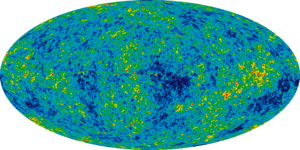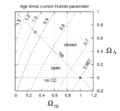The age of the universe is how long it has been since the Big Bang. This is the moment scientists believe our universe began. Right now, the best measurement for the universe's age is about 13.8 billion years. To be super exact, it's 13.798 billion years, give or take a small amount. Scientists used a special spacecraft called Planck to get these very accurate numbers. They studied the faint glow left over from the Big Bang, called cosmic microwave background radiation. They also looked at how the universe is growing bigger, which is called the expansion of the universe.
How We Know the Universe's Age
For a long time, people didn't know how old the universe was. They even thought it might have always been the same.
Early Discoveries
- In the 1800s, scientists studying geology (the study of Earth's rocks and soil) found that our planet was millions of years old. This was a big discovery!
- Then, in the 1920s, two important scientists, Georges Lemaître and Edwin Hubble, made an amazing discovery. They found out that the universe is actually getting bigger all the time. This is known as Hubble's law.
Measuring the Age
- Once scientists knew the universe was expanding, they could start to guess its age. Early guesses were not very accurate.
- Later, they used a method called radioactive dating. This is like using a very old clock found in rocks on Earth. This method helped them estimate the universe's age to be somewhere between 11 and 20 billion years.
- As technology got better, especially with spacecraft like Planck, scientists could make much more precise measurements. These newer measurements helped them narrow down the age to about 13.8 billion years.
Images for kids
-
This image shows how scientists figure out the universe's age. It uses special numbers called cosmological parameters. The box shows the best numbers that fit what we observe.
See also
 In Spanish: Edad del universo para niños
In Spanish: Edad del universo para niños

 In Spanish: Edad del universo para niños
In Spanish: Edad del universo para niños





